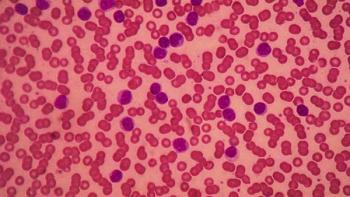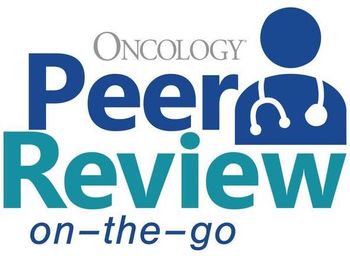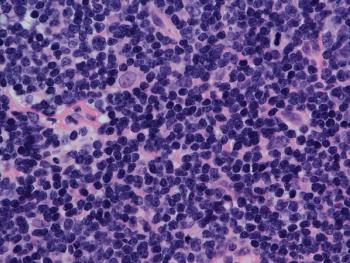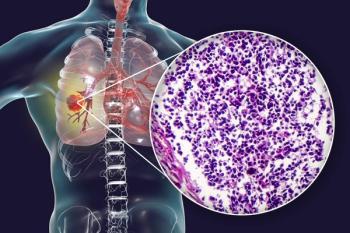
Cisplatin plus veliparib appears to improve progression-free survival among patients with BRCA-like metastatic triple-negative breast cancer, but not in those with non–BRCA-like metastatic breast cancer.

Your AI-Trained Oncology Knowledge Connection!


Cisplatin plus veliparib appears to improve progression-free survival among patients with BRCA-like metastatic triple-negative breast cancer, but not in those with non–BRCA-like metastatic breast cancer.

An expert from Rutgers Cancer Institute discusses ongoing research for mosunetuzumab in relapsed/refractory follicular lymphoma, as well as the importance of deploying the agent in the community setting.

An expert from the University of Texas MD Anderson Cancer Center discussed kidney cancer treatment updates from a recent medical conference.

Findings from the phase 3 Neotorch trial indicate that toripalimab plus chemotherapy has met the primary end point of event-free survival among patients with operable non–small cell lung cancer.

Patients who are set to undergo autologous hematopoietic stem cell transplant following induction chemotherapy may have poor mobility across several domains vs an age-matched control group.

An expert from Natera describes where future research needs to be focused for circulating tumor DNA testing in patients with colorectal cancer following the CIRCULATE-Japan study.

Findings from the phase 1/2 CA001-030 study indicate that BMS-986012 in combination with nivolumab is well tolerated among patients with small cell lung cancer.

Moxetumomab pasudotox-tdfk, approved as a treatment for relapsed/refractory hairy cell leukemia in 2018, will be withdrawn from the United States market in July 2023.

The FDA grants orphan drug designation to investigational G-quadruplex transcription inhibitor QN-302 for pancreatic cancer.

An expert from Rutgers Cancer Institute indicates that mosunetuzumab may limit unmet needs commonly associated with CAR T-cell therapy such as cost, tolerability, and access.

An expert from Natera shares multidisciplinary takeaways from the GALAXY cohort of the CIRCULATE-Japan study, assessing circulating tumor DNA as a prognostic biomarker for resectable colorectal cancer.

An expert from Natera indicates that post-operative ctDNA level may have strong prognostic and predictive value in patients with resectable colorectal cancer.

LP-284, which now has orphan drug designation from the FDA for mantle cell lymphoma, yielded positive preclinical data at the 2022 American Society of Hematology Annual Meeting and Exposition.

Yancey Warren, Jr, MD, MAT, and Lejla Hadzikadic-Gusic, MD, MSc, spoke with CancerNetwork® about their work investigating the use of integrative oncology services among young patients diagnosed with breast cancer.

Judy C. Boughey, MD, of Mayo Clinic in Rochester, Minnesota details the efficacy of breast-conserving surgery in patients with multiple ipsilateral breast cancer.

The FDA gave the dual epigenetic modulator JBI-802 an orphan drug designation to treat small cell lung cancer and acute myeloid leukemia.

An expert from Rutgers Cancer Institute reviews data that lead to the approval of mosunetuzumab for patients with relapsed/refractory follicular lymphoma.

Patients with HER2-positive breast cancer and triple-negative breast cancer may not require breast surgery if a pathological complete response can be identified using image-guided vacuum core biopsy following neoadjuvant systemic therapy.

Judy C. Boughey, MD, of Mayo Clinic in Rochester, Minnesota, details the multidisciplinary work that goes into delivering breast-conserving therapy for patients with multiple ipsilateral breast cancer.

OncobiotaLUNG, a novel liquid biopsy that detects lung cancer, now has a breakthrough device designation from the FDA.

The investigational drug CFI-402257 alone and in combination with fulvestrant received fast track designation from the FDA for patients with estrogen receptor–positive, HER2-negative advanced breast cancer.

During the 2022 Society for Urologic Oncology (SUO) Annual Meeting, an expert from the Baylor College of Medicine, discussed how perceptions around the use of testosterone therapy have evolved for patients with metastatic prostate cancer.

In a population of patients with patients with mantle cell lymphoma and follicular lymphoma, zandelisib plus zanubrutinib did not increase the rate or severity of class-related adverse effects.

Azeliragon was first evaluated in a group of patients with Alzheimer’s disease prior to being assessed in patients with glioblastoma, a fast-growing and aggressive brain tumor.

Adding the investigational oral drug BXCL701 to pembrolizumab appears effective in small cell neuroendocrine metastatic castration-resistant prostate cancer, a rare and aggressive disease.

Data from a meta-analysis suggest that single-fraction stereotactic ablative body radiotherapy could result in a lower incidence of local failure than multifractionated radiation in patients with renal cell carcinoma.

Judy C. Boughey, MD, of Mayo Clinic in Rochester, Minnesota discusses the incidence of complications and patient-reported outcomes associated with breast conservation therapy for multiple ipsilateral breast cancer.

Lenalidomide plus rituximab consolidation therapy prior to bendamustine/rituximab induction did not significantly improve progression-free survival in patients with mantle cell lymphoma in the phase 2 NCTN E1411 trial.

The National Medical Products Administration of China gives approval to mobocertinib for patients with non–small cell lung cancer harboring EGFR exon 20 insertion mutations.

The use of cobimetinib was effective in patients with Rosai-Dorfman disease, and responses were especially deep in those with KRAS or MEK alterations, according to findings from a recent retrospective study.